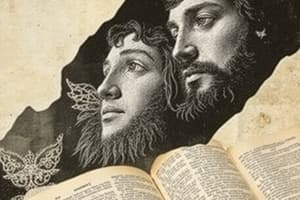Podcast
Questions and Answers
What is one of the criteria for canonicity regarding apostolic origin?
What is one of the criteria for canonicity regarding apostolic origin?
- Attributed to the teachings of the first-generation apostles (correct)
- Written during the fourth century
- Only accepted in certain Christian communities
- Contains unique theological ideas
Universal acceptance is one of the four criteria for canonicity.
Universal acceptance is one of the four criteria for canonicity.
True (A)
Name the four Gospels.
Name the four Gospels.
Matthew, Mark, Luke, John
The Gospels are a source of God's __________.
The Gospels are a source of God's __________.
Which of the following best describes the role of the evangelists as 'selectors'?
Which of the following best describes the role of the evangelists as 'selectors'?
Match the role of evangelists with their descriptions:
Match the role of evangelists with their descriptions:
Each Gospel presents an identical perspective on Jesus.
Each Gospel presents an identical perspective on Jesus.
What is the approximate date of authorship of the Gospel of John?
What is the approximate date of authorship of the Gospel of John?
The Gospel of John emphasizes the humanity of Jesus.
The Gospel of John emphasizes the humanity of Jesus.
The Gospels proclaim that Jesus came to fulfill the promises made to our __________.
The Gospels proclaim that Jesus came to fulfill the promises made to our __________.
What are the two main purposes of John's Gospel?
What are the two main purposes of John's Gospel?
John's Gospel uses high __________, which emphasizes that Jesus is God, the Eternal Word of the Father.
John's Gospel uses high __________, which emphasizes that Jesus is God, the Eternal Word of the Father.
Match the following aspects of John's Gospel:
Match the following aspects of John's Gospel:
Which Gospel is known for addressing the possible rejection and persecution of Jewish Christians?
Which Gospel is known for addressing the possible rejection and persecution of Jewish Christians?
Mark's Gospel emphasizes Jesus as the Suffering Servant.
Mark's Gospel emphasizes Jesus as the Suffering Servant.
Who was the intended audience for the Gospel of Luke?
Who was the intended audience for the Gospel of Luke?
Matthew's genealogy links Jesus to his ___________ ancestry.
Matthew's genealogy links Jesus to his ___________ ancestry.
Which Gospel highlights the presence of women in Jesus' ministry?
Which Gospel highlights the presence of women in Jesus' ministry?
The Gospel of Mark was likely authored around AD 85.
The Gospel of Mark was likely authored around AD 85.
Who was the author of the Gospel of Matthew?
Who was the author of the Gospel of Matthew?
Match the Gospel with its key theme:
Match the Gospel with its key theme:
Flashcards are hidden until you start studying
Study Notes
Introduction to the Gospels
- The heart of the Scriptures are the Gospels, which tell the story of Jesus Christ
- The four Gospels are: Matthew, Mark, Luke, and John
- They tell the good news of Jesus' incarnation, fulfillment of God's promises to humanity, and overcoming the slavery of sin and death
Four Criteria for Canonicity
- Apostolic Origin: attributed to or based on the preaching/teaching of first-generation apostles
- Universal Acceptance: acknowledged by all major Christian communities by the end of the fourth century
- Liturgical Use: read publicly along with the Old Testament during early Christian worship services
- Consistent Message: containing theological ideas compatible with other accepted Christian writings
Fourfold Role of the Evangelists
- Selectors: chose which stories to include and which to omit
- Arrangers: organized the materials in a particular sequence, often thematically
- Shapers: adapted and edited individual stories to emphasize desired themes
- Proclaimers: preached the good news about Jesus in ways that suited their audiences
Characteristics of the Gospels
- They are the main sources of information about Jesus’ life and teachings
- They are God's Revelation, where encountering Jesus is encountering God's most definitive and perfect Revelation.
- Each Gospel offers a unique perspective on Jesus
Synoptic Gospels
- Matthew, Mark, and Luke
- Similar in style and share much of the same content
The Gospel of Matthew
- Author: Jewish Christian well-versed in Hebrew Scriptures
- Date: AD 85
- Audience: Mixed community of Jewish Christians and Gentiles
- Themes: Addresses the potential rejection and persecution of Jewish Christians for believing in Jesus
- Image of Jesus: Presented as the fulfillment of Old Testament hopes and prophecies, with clear ties to Jewish ancestry
The Gospel of Mark
- Author: Gentile Christian, possibly a disciple of Peter
- Date: AD 65–70
- Audience: Non-Jewish Christians
- Themes: Addresses persecution and death experienced by the community for their beliefs
- Image of Jesus: Emphasizes the humanity of Jesus, with an aura of secrecy around his messianic identity (messianic secret), presented as the Suffering Servant, discipleship involves imitating Jesus in both ministry and suffering
The Gospel of Luke
- Author: Gentile convert to Christianity, author of both the Gospel of Luke and Acts of the Apostles
- Date: AD 80–90
- Audience: Theophilus, "lover of God"
- Image of Jesus: Compassionate Savior who welcomes all, emphasizes Jesus' ministry to the marginalized, highlights the presence of women in Jesus' ministry, addresses the plight of the sick and sinners
The Gospel of John
- Author: Unknown, but believed to be a member of a Christian community founded by the Beloved Disciple
- Date: AD 90–100
- Characteristics: Two-fold purpose: evangelize both Gentiles and Jews, strengthen the faith of both local and wider Christian communities
- Structure: Divided into two parts: first half focuses on signs that reveal Jesus' identity, second half focuses on the Passion, death, Resurrection, and Ascension (glorifying Jesus)
- Image of Jesus: Emphasizes the divinity of Jesus, using high Christology (Jesus is presented as God, the Eternal Word of the Father).
Studying That Suits You
Use AI to generate personalized quizzes and flashcards to suit your learning preferences.




